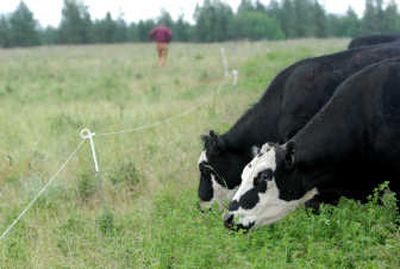Not following the herd

Maurice Robinette has been operating Lazy R Ranch in Cheney since 1980. For the past three-plus years he also has been the Eastern Washington coordinator for the Washington Sustainable Food and Farming Network. He’s combined these two jobs by practicing sustainable farming techniques on his ranch.
“One of the things that I use is the principles of holistic management,” says Robinette. “I’ve tried them on my place since the mid-90s. A lot of it has to do with mimicking natural cycles and processes in terms of managing my cows. I run my cows in large, concentrated herds, moving them fairly often to give the plants time to rest after they’ve been grazed. It’s a proven technique to enhance all ecosystem processes. It works good.”
In the Network, which began a decade ago, Robinette has two programs he primarily works on, both associated with Washington State University. BIOAg (Biologically Intensive and Organic Agriculture) combines research, education and extension and covers a wide variety of topics.
“It’s a lot of fun,” Robinette said. “It’s absolutely all kinds of different stuff. Anything from range monitoring workshops to large carcass composting.”
For his agricultural pilot project, Robinette is undertaking Beefing Up the Palouse, a state-funded project that is exploring the environmental and economic feasibility of grazing on Conservation Reserve Program land.
At the ranch, Robinette is in the midst of a major downsizing to simplify certifying his pastures as organic. By giving up a lease, he has cut his land in half and reduced the size of his cattle herd. Now he just has his own 1,000-acre property and about 100 cows and 90 yearlings, all beef cattle.
His ranching practices reflect the mission of the Network, which defines a sustainable agricultural system as one that is “economically viable, environmentally sound, and socially just over the long term.”
“The decisions are made relative to a quality of life goal that I have. So the decisions are goal-driven based on ecosystem processes,” Robinette said. “Once you’re able to put all that together you become sustainable. All at the same time keeping an eye on the bottom line and trying to make decisions that are economically good.”
Last year Robinette began raising chickens, using the same principles. He moves them to new range once a day by tractors, about 50 chickens at a time.
His family has owned the ranch since 1937, so he’s third-generation. Robinette said he did try work in the “real world” for a few years, for an energy development company in Montana. But he decided he would rather chase cows, so he returned to the family business. With ranching a full-time job, and being coordinator half time, Robinette said he stays busy, but he enjoys what he does.
“I consider it my responsibility to be a steward of the land that I own,” Robinette said. “And that if I’m a good steward for my property then I’m doing my part to be a good steward to the planet. So if what I do is overall beneficial, it’s also beneficial to society.”